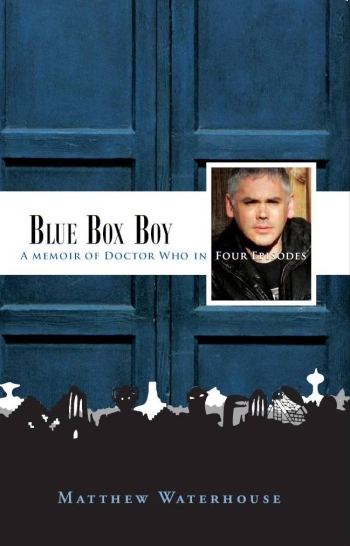Why you can trust GamesRadar+
Adric tells all in new Doctor Who memoir
Since playing early ’80s Doctor Who companion Adric, Matthew Waterhouse has become something of a figure of fun. Playing a teenage maths geek liable to side with the villain, he often managed to make simply walking across a room naturalistically look like a difficult task. When you shy away from interviews or the convention circuit, rumours tend to accrete around you, and the scathing assessments of his co-stars haven’t helped matters. The final indignity: having his name dropped in Little Britain , for comedy effect.
For anyone used to reading memoirs where TV actors struggle to cough up more than a few well-honed anecdotes, Waterhouse’s remarkable powers of recall may initially seem too good to be true. But then, he was a Who fan himself and this was his dream job – no wonder even the smallest incidents are seared on his memory. The book’s first quarter recounts that childish love affair. Long-term fans will empathise as Waterhouse touchingly recalls how his imagination was fired by novelisations, comics and hand-me-down toys; how he daydreamed he might be an exiled Time Lord himself.
But there’s a storm on the horizon, and its name is Tom. The discovery of a balled-up page of script marked “Baker” tossed in a corner of the rehearsal room is an early omen. Waterhouse’s illusions are shattered when he starts work on the erratic Fourth Doctor’s final series - the atmosphere is fractious, to say the least. The star is breathtakingly rude, and filming often takes place in a room “fogged with his rage”. Fellow companion Lalla Ward (with whom Baker had a tempestuous love/hate relationship, and ultimately disastrously married) is teary. Matthew eventually ends up telling his one-time hero to “f**k off”. The degree of candour is startling – no-one who worked on Who has ever written about the experience with such brutal honesty, and doubtless no-one ever will again. The myth that all programme makers respect their viewers is demolished, and accusations of bullying (oddly sexualised bullying, at that) aimed at one director would be grounds for a libel suit if the man concerned were still alive.
Waterhouse has a droll sense of humour, and a talent for a cutting turn of phrase, though the book would benefit greatly from a ruthless edit to trim it of countless pointless digressions. He also employs the odd conceit of telling his story entirely in the third person. This makes a certain sense – looking back at his 18-year-old self must seem like discussing a different person - but quickly grates. His habit of remarking on seamy physical details – grubby nails, a dodgy wig, nicotine-stained fingers – comes across as rather bitchy (Matthew's own state of personal hygiene is not recorded for posterity). And while it’s possible to claim “public interest” in the matter of Tom Baker’s sweaty armpits, do we really need to know about the slightly pathetic personal foibles of so-called “big-name fans”? That seems particularly petty.
Still, better to be seen as bitchy than be forever frozen in amber as an awkward teen. If nothing else, this flawed but fascinating memoir transforms Matthew Waterhouse from a crude fanboy construct into a living, breathing human being.
Ian Berriman
Ian Berriman has been working for SFX – the world's leading sci-fi, fantasy and horror magazine – since March 2002. He's also a regular writer for Electronic Sound. Other publications he's contributed to include Total Film, When Saturday Comes, Retro Pop, Horrorville, and What DVD. A life-long Doctor Who fan, he's also a supporter of Hull City, and live-tweets along to BBC Four's Top Of The Pops repeats from his @TOTPFacts account.



